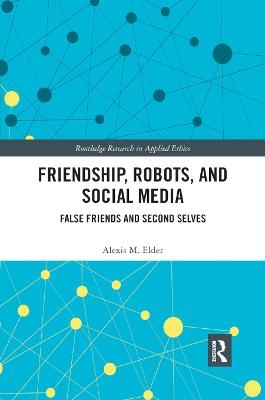
Friendship, Robots, and Social Media
Routledge (Verlag)
978-0-367-88943-2 (ISBN)
Various emerging technologies, from social robotics to social media, appeal to our desire for social interactions, while avoiding some of the risks and costs of face-to-face human interaction. But can they offer us real friendship? In this book, Alexis Elder outlines a theory of friendship drawing on Aristotle and contemporary work on social ontology, and then uses it to evaluate the real value of social robotics and emerging social technologies.
In the first part of the book Elder develops a robust and rigorous ontology of friendship: what it is, how it functions, what harms it, and how it relates to familiar ethical and philosophical questions about character, value, and well-being. In Part II she applies this ontology to emerging trends in social robotics and human-robot interaction, including robotic companions for lonely seniors, therapeutic robots used to teach social skills to children on the autism spectrum, and companionate robots currently being developed for consumer markets. Elder articulates the moral hazards presented by these robots, while at the same time acknowledging their real and measurable benefits. In the final section she shifts her focus to connections between real people, especially those enabled by social media. Arguing against critics who have charged that these new communication technologies are weakening our social connections, Elder explores ways in which text messaging, video chats, Facebook, and Snapchat are enabling us to develop, sustain, and enrich our friendship in new and meaningful ways.
Alexis M. Elder is an assistant professor of philosophy at the University of Minnesota Duluth. Her research focuses on friendship and social technologies. Her publications include "Excellent Online Friendships: An Aristotelian Defense of Social Media" in Ethics and Information Technology, and "Zhuangzi on Friendship and Death" in Southern Journal of Philosophy.
Introduction
Part I: Friendship
1 Repeatable Reasons, Irreplaceable Friends
2 What Shared Identity Means In Friendship
3 Why Bad People Can’t Be Good Friends
Part II: Robots
4 False Friends And False Coinage: A Tool For Navigating The Ethics Of Sociable Robots
5 What’s Wrong With Robot ‘Friends’ For Lonely Seniors?
6 Counterfeit Currency Versus Monopoly Money: Using Appearances To Build Capacities
7 Should You Buy Yourself A ‘Friend’? Ethics Of Consumer Markets For Robot Companions
Part III: Social Media
8 Humans Aren’t Cows: An Aristotelian Defense Of Technologically-Mediated Friendship
9 Taking Control Of Conversations Through Technologically-Mediated Communication
10 What Words Can’t Say: Emoji And Other Non-Verbal Elements Of Technologically-Mediated Communication
11 The Moral Import Of Medium
| Erscheinungsdatum | 24.12.2019 |
|---|---|
| Reihe/Serie | Routledge Research in Applied Ethics |
| Verlagsort | London |
| Sprache | englisch |
| Maße | 152 x 229 mm |
| Gewicht | 453 g |
| Themenwelt | Geisteswissenschaften ► Philosophie ► Ethik |
| Sozialwissenschaften ► Kommunikation / Medien ► Medienwissenschaft | |
| Sozialwissenschaften ► Soziologie | |
| ISBN-10 | 0-367-88943-9 / 0367889439 |
| ISBN-13 | 978-0-367-88943-2 / 9780367889432 |
| Zustand | Neuware |
| Haben Sie eine Frage zum Produkt? |
aus dem Bereich


